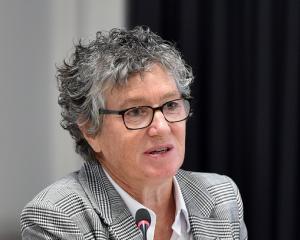No part of Dunedin remains untouched as gang numbers in the city swell, with members seeking a share of the lucrative cannabis market, police say.
Four arrests in the past week and the recall of a senior Black Power member to prison have followed the drive-by shooting of a South Dunedin house, the arson of another house and the firing of Molotov cocktails at several other properties over the past fortnight.
Last night, initial reports suggested gang members were involved in an altercation where one party attacked a vehicle with a golf club following a nose-to-tail crash involving a member of the public in Andersons Bay Rd.
A fight ensued before the parties left the scene.
Dunedin police organised crime squad head Detective Sergeant John Hedges said the Mongrel Mob had increased recruiting in recent months as Black Power members moved to Dunedin, looking to set up a new headquarters and cash in on the cannabis trade.
"They are wanting to prove themselves."
The recent release from prison of Black Power kingpin Albert Epere heightened gang tensions further.
But while gangs now had associates and recruits living in houses across the city - to the point of certain areas being known as red or blue suburbs - the problem was not out of hand.
"There's always the underlying tensions - sometimes they just bubble up.
We've had a lot of fresh faces come to Dunedin from other gangs to try and establish themselves.
"So you get an immediate reaction from the Mongrel Mob, who go out and recruit their numbers, and suddenly they [the recruits] all want to earn their T-shirt and the game's on.
"This is no different to anywhere else in the country . . . We've had it good in Dunedin. It's still manageable down here."
But the increasingly violent incidents over the past two weeks between the Mongrel Mob and Black Power gangs were unacceptable and endangered the public, he said.
The drive-by shooting of a house, similar to an incident in which 2-year-old Jhia Te Tua was killed in Wanganui in May 2007, was particularly concerning.
"That's why we went in hard and arrested them all. We did it to get the guns."
The public became more aware of gang activity when the police made it their focus, which could, in turn, escalate gang activity.
It was hoped now Epere had been recalled to prison the situation would remain calm, but police were still treating all gang members as armed.
New recruits were for the most part young people from Dunedin.
"The Mongrel Mob don't have a feeder group. They don't need it. They can do it from their own base through family. And once [a gang has] got you, it's very difficult to get out," he said.
This meant gang activity was not only an issue for police, but for the community as well.
"The gangsters are well and truly entrenched in society and it's up to society to stop them, not us. It's society's issue," Det Sgt Hedges said.
Gangs survived on status and image.
"If you have the status, you get the young people in. Take away the status and it hinders the gang's growth."
Attempts to contact Dunedin Mayor Peter Chin last night for comment on the city's gang-related issues were unsuccessful.












